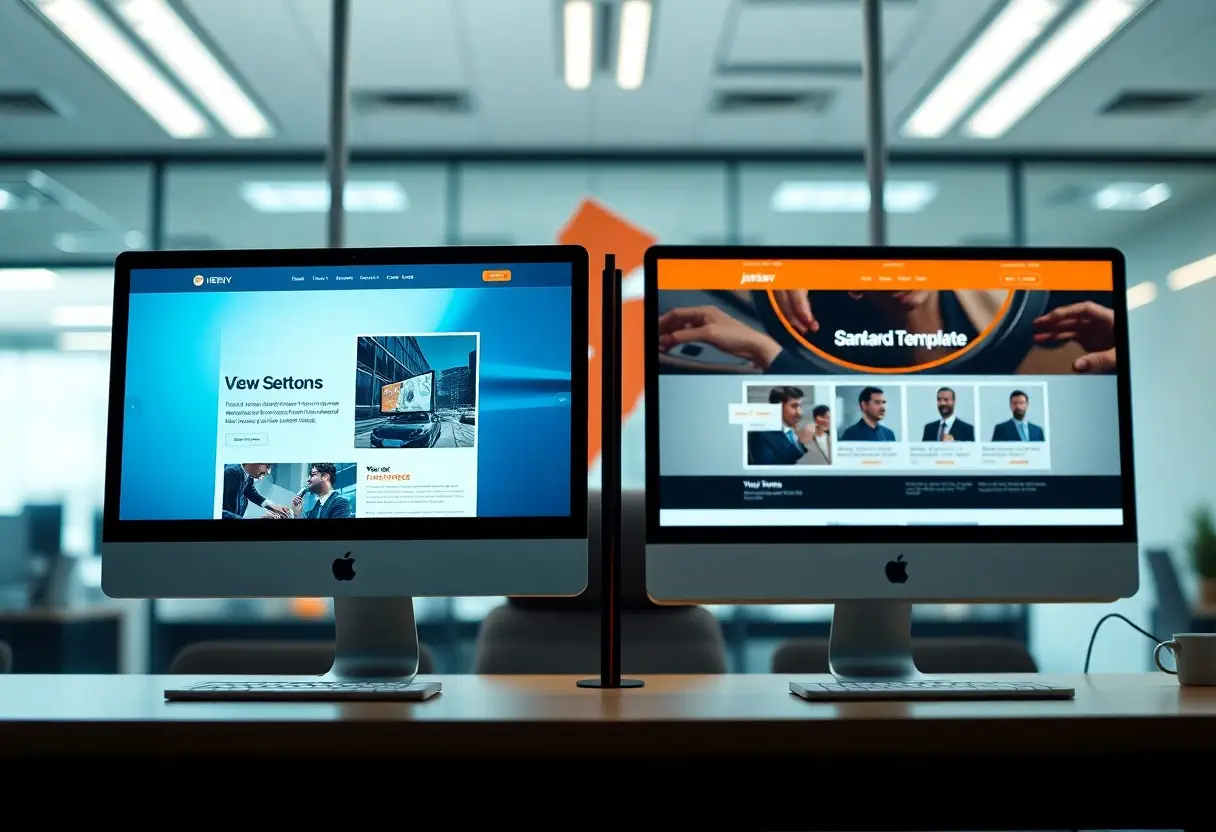
There’s a lot to consider when choosing between a custom or template website for your NJ business. Each option has distinct advantages and challenges that can greatly impact your online presence and overall success. In this post, we’ll break down the key differences, helping you understand which solution aligns best with your unique needs and goals. Whether you’re aiming for a bespoke design or a quick and cost-effective template, you’ll gain valuable insights to make an informed decision.

Key Takeaways:
- Customization: Custom websites offer tailored features and designs that suit your specific business needs, while template websites provide a quick, standardized solution.
- Cost: Template websites tend to be more affordable initially, but custom websites can provide better long-term value through scalability and unique branding.
- Control: With a custom website, you have complete control over every aspect of the design and user experience, whereas templates may limit flexibility.
- Time: Template websites can be launched quickly, making them ideal for businesses needing an immediate online presence, while custom sites require more time for development.
- SEO Potential: Custom websites often allow for better optimization strategies catered to your specific audience, while templates might have predefined structures that could limit SEO effectiveness.
Understanding Custom Websites
The landscape of web design offers numerous options, but custom websites stand out for their unique approach. For more insights on making the right choice for your New Jersey business, check out Custom vs. Template Websites: Find the Best Fit for Your ….
Definition and Features
Custom websites are uniquely designed and developed to meet specific needs and brand identities. Unlike template solutions, they involve tailored features, user interfaces, and functionalities, allowing for complete creative control and enhanced user experience.
Advantages for NJ Businesses
Across New Jersey, businesses can greatly benefit from custom websites that reflect their unique brand and services. These websites are not only designed to stand out but also offer systemic advantages regarding functionality and responsiveness.
Advantages of custom websites include tailored designs that align with your business goals, improving brand recognition. You’ll enjoy increased flexibility in adding features as your business grows, ensuring your website evolves with your needs. Moreover, custom sites can be optimized for SEO right from the start, giving your NJ business a competitive edge in local search rankings. Additionally, you gain better integration with existing systems, enhancing overall operational efficiency.
Exploring Template Websites
It is important to understand what template websites entail, especially when considering your options for a digital presence. Template websites offer pre-designed layouts that you can customize with your content. These designs are user-friendly and often come with built-in functionalities, making them a popular choice for businesses seeking efficiency without sacrificing design quality.
Definition and Features
After evaluating your needs, you will find that template websites are importantly ready-made designs that can be adapted to fit various industries. They typically include important features such as responsive design, SEO optimization, and a variety of visual elements, which allow you to create a professional online presence quickly.
Benefits for Small Enterprises
The appeal of template websites for small enterprises lies in their accessibility and cost-effectiveness. By choosing a template, you minimize the time and resources you would spend on developing a site from scratch. This allows you to focus your efforts on other vital aspects of your business while still achieving a modern site that showcases your brand.
Due to their affordable pricing and ease of use, template websites can be an excellent investment for small enterprises. They offer a fast turnaround, often enabling you to go live in just days, rather than weeks or months required for custom sites. This means you can start attracting customers sooner while avoiding hefty development costs. Furthermore, many template options come with support and tutorials, making it easier for you to update or modify your website as your business grows.
Key Differences Between Custom and Template Websites
Once again, it’s imperative to understand the key differences between custom and template websites. Custom websites are uniquely designed from scratch to meet your specific needs, offering greater flexibility and a one-of-a-kind user experience. In contrast, template websites utilize pre-designed layouts that can be easily modified, providing a faster and more cost-effective solution. Ultimately, your choice will depend on your business goals, brand identity, and available resources.
Cost Considerations
By evaluating cost considerations, you can better determine which website option fits your budget. Custom websites typically require a larger upfront investment, as they involve extensive design and development time. Template websites, on the other hand, allow for considerable savings, as they provide a more affordable option without sacrificing imperative features.
Time to Launch
With time to launch as a factor, template websites are often the faster choice since they are readily available and easier to set up. Custom websites can take weeks or even months to fully develop, depending on the complexity of your requirements. This means that if you’re looking to establish an online presence quickly, templates might be the way to go.
In addition, the extended timeline for launching a custom site involves multiple phases, including design brainstorming, development sprints, and thorough testing. This process allows for a tailored finish that matches your vision perfectly, but it does require patience. If your business is in need of immediate online access or a timely promotion, a template website can be a pragmatic solution, enabling you to start reaching customers sooner rather than later.
Evaluating Your Business Needs
Keep in mind that assessing your business requirements is important before deciding between a custom or template website. Consider factors such as your budget, timeline, and the specific functionalities you desire. For further guidance, check out Should You Use a Website Template or Go Custom? to help you make an informed decision that aligns with your business objectives.
Industry Considerations
To effectively choose the right website type, analyze the standards and expectations specific to your industry. For example, e-commerce sites may require different functionalities than service-oriented businesses. By understanding your industry’s unique demands, you can select a website option that enhances your competitive edge.
Long-Term Goals
Below, consider how your long-term business goals influence your website decision. Are you planning to expand your services, product offerings, or target audience in the future? A custom website may provide the flexibility and scalability you need as your business evolves.
Considerations for long-term success include ensuring that your website can adapt to changes in your business strategy. If you foresee your business growing or changing significantly, a custom website might be the way to go, as it offers more adaptability and unique features that can be tailored to your future needs. Keep your future vision in mind to make a choice that supports your business’s ongoing growth.

Making the Decision: Custom vs. Template
All businesses face the challenge of choosing between custom and template websites. This decision should align with your brand identity, budget, and long-term goals. While custom websites provide unique designs tailored to your needs, template websites offer cost-effectiveness and faster setup times. Ultimately, assessing your business’s specific requirements will guide you toward the right choice.
Factors to Consider
Along with design preference, it’s crucial to evaluate several factors that influence your decision-making. Consider the following:
- Your budget and resources.
- The complexity of your website functionalities.
- Your business timeline for launching the site.
- Future scalability and updates needed.
Assume that understanding these factors will help clarify the best path forward.
Case Studies of NJ Businesses
Making an informed decision is often easier when you see real-world examples. Here are case studies showcasing how NJ businesses fared with custom versus template websites:
- Business A: Custom website resulted in a 40% increase in user engagement and a 30% boost in sales within 6 months.
- Business B: Template website saved $3,000 in initial costs, leading to a 20% growth in customer acquisition over the first year.
- Business C: Custom site led to improved brand perception, with 90% of new customers citing the website as a key factor in their purchase decision.
- Business D: Template website provided a responsive design, increasing mobile traffic by 50% after redesign.
In addition to these case studies, the decision between custom and template websites can significantly impact your digital presence. Quality design often translates to user satisfaction. Businesses that invest in customized solutions may see enhanced brand loyalty, while others may find templates effective based on budget constraints. The measuring metrics provide insight into the potential outcome of your choice.
- Monthly traffic growth showed a 25% increase for Business A post-relaunch.
- Business B’s social media shares surged by 60% after adopting a template approach.
- Business C retained 40% of new customers, thanks to better user experience from a custom site.
- Business D observed higher conversion rates; sales jumped by 15% with improved mobile accessibility.
Frequently Asked Questions
To help you navigate the decision between custom and template websites, this section addresses some common queries. Whether you’re considering the budget impact, development time, or long-term use, understanding the key points can greatly assist you in making an informed choice for your NJ business.
Common Misconceptions
Around website design, there are many misconceptions. Some believe custom websites are always better because of their unique design, while others think templates are inferior due to their generic nature. In reality, the best choice depends on your specific needs, goals, and available budget. Both options can serve successful businesses if chosen strategically.
Tips for Choosing the Right Option
Along your journey to selecting the right website for your business, consider the following tips:
- Define your business goals and target audience clearly.
- Assess your budget for initial creation and ongoing maintenance.
- Evaluate how quickly you need the site up and running.
- Consider any needed custom features that will enhance user experience.
Assume that understanding these factors will lead you to the ideal website solution for your needs.
Tips for a successful website selection process include taking a closer look at both your short and long-term objectives. Determine what functionalities and design elements are vital for your business, and prioritize them:
- Research the competition and see what seems to work.
- Consult web design experts for professional advice tailored to your industry.
- Request samples or demos before making a commitment.
- Consider scalability for future growth and additional features.
Assume that a thoughtful approach will yield a website that effectively represents your brand and meets your business needs.
Conclusion
Now that you understand the differences between custom and template websites, it’s important to assess your specific needs and budget for your NJ business. A custom design offers unique branding and tailored functionalities, while a template can provide a cost-effective and relatively quick solution. Consider what aligns best with your goals and customer experience. For a deeper explore the pros and cons, check out this Custom Design Vs. Template Website: Which One is Best? resource to help you make a more informed decision.
FAQ
Q: What is the primary difference between custom websites and template websites?
A: Custom websites are designed from scratch, tailored specifically to meet the unique needs and branding of a business. They provide greater flexibility and customization options. In contrast, template websites use pre-designed layouts that can be easily modified but are limited in their ability to fully align with a brand’s identity.
Q: What are the cost implications of choosing a custom website over a template website?
A: Custom websites typically require a higher initial investment due to the extensive design and development work involved. On the other hand, template websites are more affordable upfront since they leverage existing designs. However, businesses should consider long-term maintenance costs and the potential need for upgrade or redesign if the template does not meet future needs.
Q: How does the timeline for launching a custom website compare with that of a template website?
A: Launching a template website is typically quicker as it involves selecting a design and making necessary adjustments. This can often be completed within days or weeks. In contrast, a custom website can take several weeks to months due to the in-depth design process, iterations, and testing required to achieve the desired end product.
Q: Can template websites be customized significantly to fit my NJ business needs?
A: While template websites offer some level of customization, there are limitations to how much they can be altered. You can change colors, images, and content, but fundamental changes to layout and functionality are often constrained. Custom websites provide more freedom to create features specifically suited for your business goals.
Q: For an NJ business looking for growth, which option is typically more advantageous, a custom website or a template?
A: A custom website may be more advantageous for a growing NJ business, as it can scale alongside the business’s evolving needs and allow for specific functionalities that facilitate growth. Custom solutions can better integrate with other business tools and offer unique user experiences that a template site may struggle to replicate.





